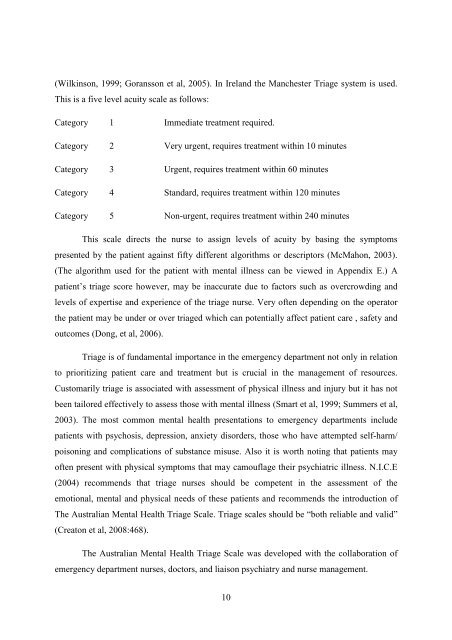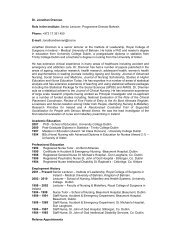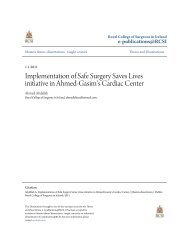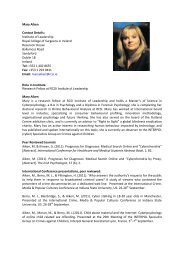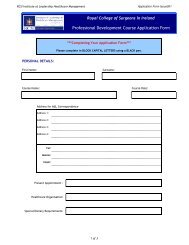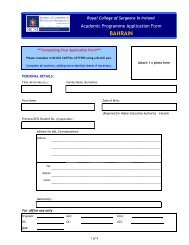Improving the Assessment and Triage of Patients with Mental Illness ...
Improving the Assessment and Triage of Patients with Mental Illness ...
Improving the Assessment and Triage of Patients with Mental Illness ...
You also want an ePaper? Increase the reach of your titles
YUMPU automatically turns print PDFs into web optimized ePapers that Google loves.
(Wilkinson, 1999; Goransson et al, 2005). In Irel<strong>and</strong> <strong>the</strong> Manchester <strong>Triage</strong> system is used.<br />
This is a five level acuity scale as follows:<br />
Category 1 Immediate treatment required.<br />
Category 2 Very urgent, requires treatment <strong>with</strong>in 10 minutes<br />
Category 3 Urgent, requires treatment <strong>with</strong>in 60 minutes<br />
Category 4 St<strong>and</strong>ard, requires treatment <strong>with</strong>in 120 minutes<br />
Category 5 Non-urgent, requires treatment <strong>with</strong>in 240 minutes<br />
This scale directs <strong>the</strong> nurse to assign levels <strong>of</strong> acuity by basing <strong>the</strong> symptoms<br />
presented by <strong>the</strong> patient against fifty different algorithms or descriptors (McMahon, 2003).<br />
(The algorithm used for <strong>the</strong> patient <strong>with</strong> mental illness can be viewed in Appendix E.) A<br />
patient’s triage score however, may be inaccurate due to factors such as overcrowding <strong>and</strong><br />
levels <strong>of</strong> expertise <strong>and</strong> experience <strong>of</strong> <strong>the</strong> triage nurse. Very <strong>of</strong>ten depending on <strong>the</strong> operator<br />
<strong>the</strong> patient may be under or over triaged which can potentially affect patient care , safety <strong>and</strong><br />
outcomes (Dong, et al, 2006).<br />
<strong>Triage</strong> is <strong>of</strong> fundamental importance in <strong>the</strong> emergency department not only in relation<br />
to prioritizing patient care <strong>and</strong> treatment but is crucial in <strong>the</strong> management <strong>of</strong> resources.<br />
Customarily triage is associated <strong>with</strong> assessment <strong>of</strong> physical illness <strong>and</strong> injury but it has not<br />
been tailored effectively to assess those <strong>with</strong> mental illness (Smart et al, 1999; Summers et al,<br />
2003). The most common mental health presentations to emergency departments include<br />
patients <strong>with</strong> psychosis, depression, anxiety disorders, those who have attempted self-harm/<br />
poisoning <strong>and</strong> complications <strong>of</strong> substance misuse. Also it is worth noting that patients may<br />
<strong>of</strong>ten present <strong>with</strong> physical symptoms that may camouflage <strong>the</strong>ir psychiatric illness. N.I.C.E<br />
(2004) recommends that triage nurses should be competent in <strong>the</strong> assessment <strong>of</strong> <strong>the</strong><br />
emotional, mental <strong>and</strong> physical needs <strong>of</strong> <strong>the</strong>se patients <strong>and</strong> recommends <strong>the</strong> introduction <strong>of</strong><br />
The Australian <strong>Mental</strong> Health <strong>Triage</strong> Scale. <strong>Triage</strong> scales should be “both reliable <strong>and</strong> valid”<br />
(Creaton et al, 2008:468).<br />
The Australian <strong>Mental</strong> Health <strong>Triage</strong> Scale was developed <strong>with</strong> <strong>the</strong> collaboration <strong>of</strong><br />
emergency department nurses, doctors, <strong>and</strong> liaison psychiatry <strong>and</strong> nurse management.<br />
10


